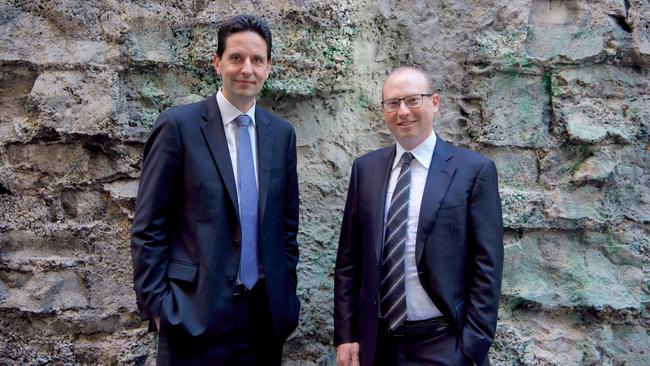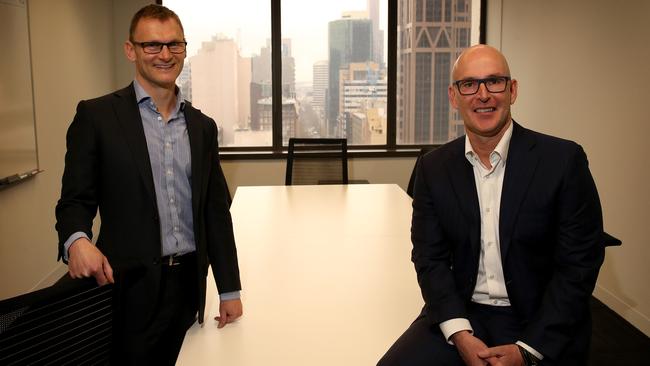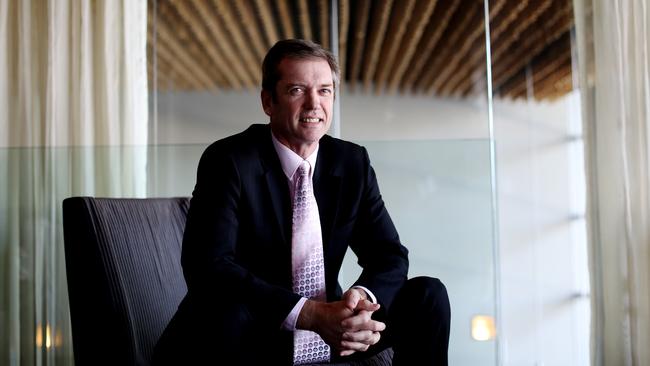L1 Capital’s $300m profits in three years outshines fellow stock pickers
Melbourne duo, Mark Landau and Rafi Lamm’s fund has made over $300m in three years while some of Australia’s other big stock pickers have stumbled.

Meet the Melbourne boutique fund managers who have shot the lights out since Covid-19 hit the markets.
L1 Capital founders Mark Landau and Rafi Lamm have made almost $300m in net profits for their privately held firm since 2020 – far more than some of the biggest stock picker names in funds management.
Landau and Lamm’s firm recorded a net profit of $71m in the year to June 30, adding to the $221m in profits it generated in the previous two years, and paid the founders $88m in dividends.
L1 Capital manages the ASX-listed L1 Long Short fund, which has been a lucrative pursuit for Landau and Lamm – they’ve shared $288m in dividends since 2020.
The pair have outperformed most of their privately owned fund manager peers, with big names like Paradice Investment Management, Cooper Investors, Greencape Capital and Vinva Investment Management all suffering profit falls after finding it difficult to outperform a surprisingly strong market.
The S&P/ASX 200 benchmark jumped 9.7 per cent in the year to June 30, well above the decade-average gain of 6.6 per cent. The benchmark has fallen almost 4 per cent in the past six months though. Total profits for 10 of the best-known boutique fund managers which have lodged their financial reports fell 19 per cent to $217m in 2023, compared to $268m last year. Total revenue was $629m.
The fund managers also paid out more in dividends – about $240m – than they made in total net profit in 2023, though some of those dividends were paid after the end of the financial year.
Documents lodged with the corporate regulator show that L1 has earned an increasing chunk of its revenue, which reached $147m for the 2023 financial year, from performance fees.
L1 had about $104m in performance fees, its 2023 financial report revealed, compared to $42m in management fees for its clients which include large superannuation and pension funds, financial planning groups, wealthy individuals and family offices.
The firm’s L1 Long Short portfolio returned 13.5 per cent in the year to June 30. More recently it was down -3.1 per cent in October but has returned 25.7 per cent in the past three years against an 8.9 per cent rise for its benchmark S&P/ASX200 Accumulation Index.

In its note to clients last week, L1 said it had identified numerous “mis-priced stocks that we believe will deliver very attractive long-term returns” as markets became more volatile.
“We believe equity markets are facing opposing forces of positivity from moderating inflation and potential policy stimulus in China, offset by negativity from weak leading economic indicators, heightened geopolitical tensions and increasing pressure on corporate earnings.
“We anticipate rising market volatility as investors continue to reassess their expectations for the economy, interest rates and corporate profits.”
Other firms that delivered big profits included Hyperion Asset Management, which made a $40m net profit for 2023 from $70m revenue.

The Hyperion Australian Small Cap Composite, the Hyperion Australian Large Cap Composite, Hyperion Global VSG Composite and Hyperion Australian Broad Cap Composite funds all made returns above their benchmarks for the year. The second biggest dividend payer was David Pace and Matthew Ryland’s Greencape Capital, which paid $17m dividends during the 2023 financial year as well as $17m paid in July and September.
Greencape’s net profit fell from $33.6m in 2022 to $28.6m, though it was one of many fund managers to also suffer a drop in its results for the year.
Peter Cooper’s firm Cooper Investors saw its surplus drop from about $32m in 2022 to almost $12m. Most of that fall was due to a big drop in revenue, as a result of a lack of performance fees.
Revenue in 2022 for Cooper Investors was $100m, including $38m in performance fees paid for outperforming the benchmarks for the various Cooper funds. But with only $2m in performance fees derived in 2023, total revenue fell to $55m.
Vinva Investment Management, established by a team led by managing director and head of equity investments Morry Waked after he left Blackrock in 2010, recorded a $13.9m profit for the year, down from $22.2m in 2022.

Investment fee revenue decreased by $12.7m to $41.6m for the year, comprising $41.1m management fees and only about $500,000 performance fees. Vinva is a quant-driven fund which manages money for some of Australia’s biggest investment funds. Its assets under management fell $1.11bn to $22.87bn.
Net profit for Geoff Wilson’s private Wilson Asset Management (International) vehicle, which gets management fees from various Wilson listed investment companies, halved to about $9.7m.
Paul Moore’s PM Capital had a net profit increase from $9.5m in 2022 to about $12m this year.
Moore recently agreed to a $150m deal, comprising $20m cash and $130m scrip, to sell the business to Regal Partners.








To join the conversation, please log in. Don't have an account? Register
Join the conversation, you are commenting as Logout